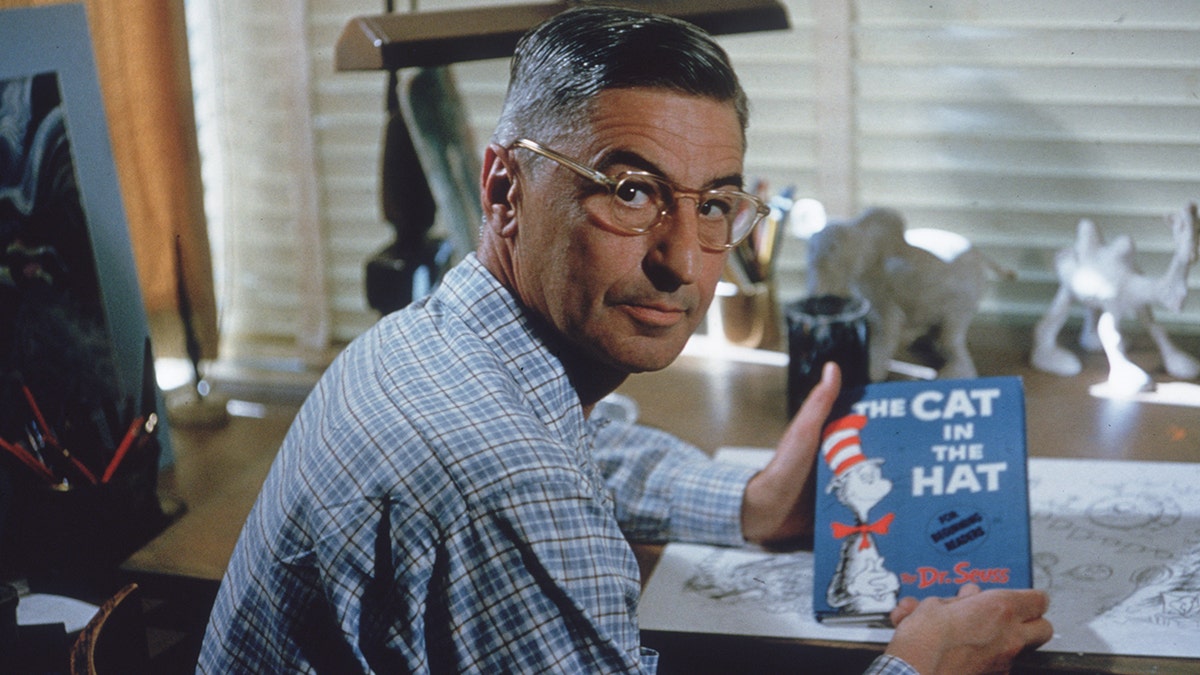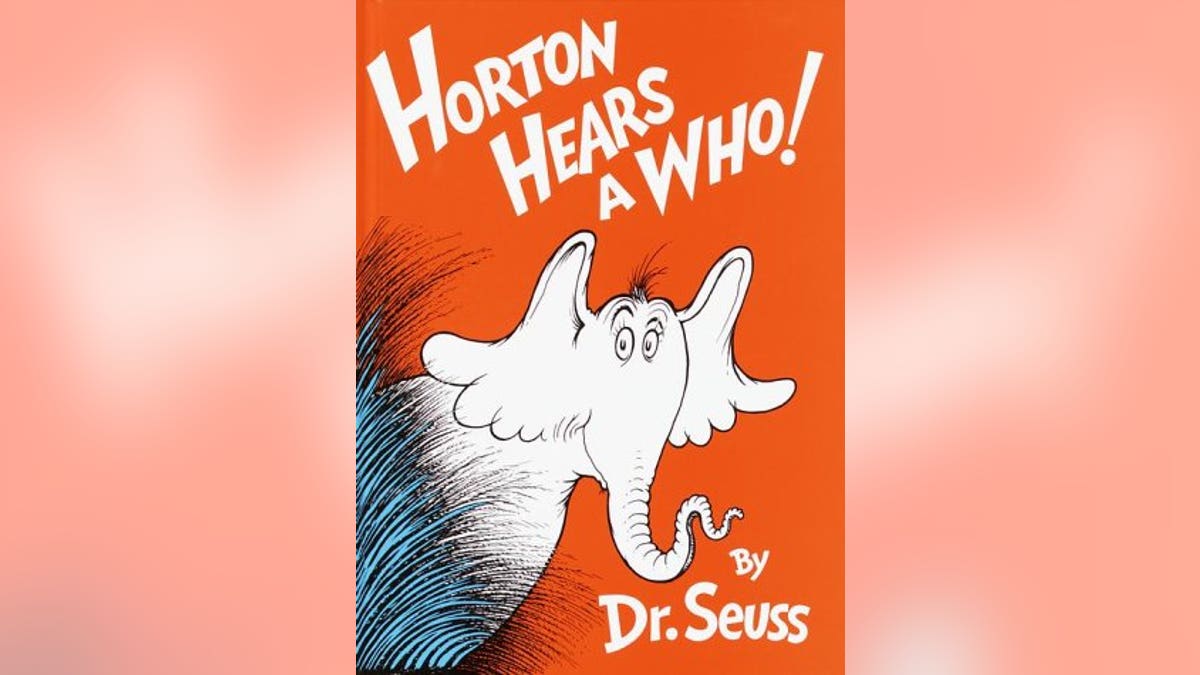Fox Nation premieres new special: 'Closing the Book: The Cancelation of Dr. Seuss'
Fox News contributor Tammy Bruce explores author's life, sudden firestorm over his books
The White House will include Dr. Seuss in its 2022 "Read Across America Day" Tuesday after dropping the legendary children’s author from the annual celebration of reading last year.
President Biden last year followed the presidential tradition in proclaiming "Read Across America Day" on March 2, Dr. Seuss’ birthday, but bucked his predecessors by leaving out any mention of Dr. Seuss from that proclamation.
But this year, the White House’s annual proclamation points to the "path to literacy" for many young Americans, saying it "begins with timeless traditions: being read to at bedtime, gathering in classrooms for story time, and attending events at local libraries with family and friends."

American author and illustrator Dr. Seuss sits at his drafting table in his home office with a copy of his book "The Cat in the Hat" in La Jolla, California, April 25, 1957. (Gene Lester/Getty Images)
"Children’s classics such as Dr. Seuss’ ‘Green Eggs and Ham’ and ‘Oh, the Places You’ll Go!’ Have inspired a passion for reading and endless creativity that spans generations," the White House’s proclamation said Tuesday.
"Today’s stories and adventures are as diverse as the world in which we live, and by reading them, we come to more fully understand the vibrant diversity of our Nation—and the world," the White House said. "This is especially important as young people learn and grow and engage with their own sense of identity."
The White House added: "Books build each child’s sense of belonging and can help inculcate respect and empathy for others."
When asked why Dr. Seuss was not included last year, the White House declined to comment.
Last year, the White House also dodged questions on why Dr. Seuss books were not included, and instead, White House press secretary Jen Psaki said it was "especially important that we ensure all children can see themselves represented and celebrated, celebrated in the books that they read."

President Obama gets a round of applause after reading "Green Eggs and Ham," by Dr. Suess, for a group of children and his family, first lady Michelle Obama (R) and daughters Malia Obama (L), 11, and Sasha Obama, 8, during the Easter Egg Roll at the White House April 5, 2010, in Washington, D.C. (Chip Somodevilla/Getty Images)
Psaki last year was asked whether the decision had to do with the controversy surrounding a lack of diversity in Dr. Seuss' books, to which she replied: "Again, I think it is important that children of all backgrounds see themselves in the children's books that they read."
The Biden White House’s 2021 decision came after former Presidents Obama and Trump both highlighted Dr. Seuss’ contributions in their annual proclamations.
PSAKI WON’T SAY WHY DR. SEUSS WAS DROPPED FROM BIDEN READING PROCLAMATION
"The works of Theodor Seuss Geisel, better known to us as Dr. Seuss, have sparked a love for reading in generations of students.," Obama said in his 2015 proclamation. "His whimsical wordplay and curious characters inspire children to dream big and remind readers of all ages that 'a person's a person no matter how small.’"
Obama's 2016 proclamation described Seuss as "one of America's revered wordsmiths" who "used his incredible talent to instill in his most impressionable readers universal values we all hold dear."
Trump, in his 2018 proclamation, urged Americans to "always remember the still-vibrant words of Dr. Seuss: 'You have brains in your head. You have feet in your shoes. You can steer yourself any direction you choose.'"
Then-first lady Melania Trump celebrated Read Across America Day in 2017 by reading Dr. Seuss books to hospitalized children.
Meanwhile, the sales of six Dr. Seuss books ceased last year over racist and insensitive imagery, according to Dr. Seuss Enterprises, which preserves and protects the author’s legacy.
"These books portray people in ways that are hurtful and wrong," Dr. Seuss Enterprises told The Associated Press in a statement last year.

Dr. Seuss' "Horton Hears a Who!" (Courtesy of Carnival Cruise Line)
"Ceasing sales of these books is only part of our commitment and our broader plan to ensure Dr. Seuss Enterprises’ catalog represents and supports all communities and families," the statement continued.
Copies of "And to Think That I Saw It on Mulberry Street," "If I Ran the Zoo," "McElligot's Pool," "On Beyond Zebra!," "Scrambled Eggs Super!" and "The Cat's Quizzer" will no longer be published.
The decision to cease publication and sales of the books was made last year after months of discussion, the company told AP.
"Dr. Seuss Enterprises listened and took feedback from our audiences including teachers, academics and specialists in the field as part of our review process. We then worked with a panel of experts, including educators, to review our catalog of titles," it said.
Books by Dr. Seuss -- born Theodor Seuss Geisel in Springfield, Massachusetts, on March 2, 1904 – are sold in more than 100 countries.
The "How the Grinch Stole Christmas!" author remains popular, earning an estimated $33 million before taxes in 2020, up from just $9.5 million five years ago, the company said. Forbes listed him No. 2 on its highest-paid dead celebrities of 2020, behind only the late pop star Michael Jackson.
CLICK HERE TO GET THE FOX NEWS APP
As adored as Dr. Seuss is by millions around the world for the positive values in many of his works, including environmentalism and tolerance, there has been increasing criticism in recent years over the way Black, Asian and other characters are drawn in some of his most beloved children’s books, as well as in his earlier advertising and propaganda illustrations.
The National Education Association, which founded Read Across America Day in 1998 and deliberately aligned it with Geisel’s birthday, has for several years deemphasized Seuss and encouraged a more diverse reading list for children.
Fox News’ Peter Hasson, Audrey Conklin and The Associated Press contributed to this report.















































